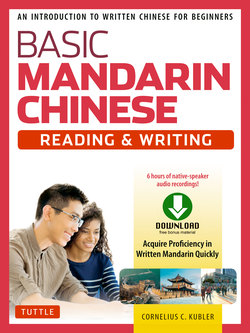Читать книгу Basic Mandarin Chinese - Reading & Writing Textbook - Cornelius C. Kubler - Страница 14
На сайте Литреса книга снята с продажи.
ОглавлениеPART 4
More Common Personal Names and Place Names
New Characters and Words
Study the six characters below and the common words written with them, paying careful attention to each character’s pronunciation, meaning, and structure, as well as similar-looking characters. After you’ve studied a character, turn to the Practice Book volume and practice writing it on the practice sheet, making sure to follow the correct stroke order and direction as you pronounce it out loud and think of its meaning.
| 19 | 何 | hé | who, what, how |
| Radical is 人 rén “person,” which is written 亻 when occurring at the left side of a character so as not to get in the way of the component at the right. The colloquial name for this radical is 人字旁 rénzìpáng “side made up of the character 人.” The phonetic in 何 is 可 kĕ “may” [BF]. | |||
| 何 | Hé | He, Ho [SN] | |
| 20 | 李 | lĭ | plum |
| Radical is 木 mù “tree” [BF]. The other component is 子 zĭ “son” [BF]. The “plum” is the “son” (or fruit) of the plum “tree.” | |||
| 李 | Lĭ | Li, Lee (also Lee, Rhee, or Yi, the second-most-common Korean surname) [SN] | |
| 21 | 文 | wén | writing, literature |
| 文 is itself a radical. 文 also serves as a phonetic, e.g., 蚊 wén as in 蚊子 wénzi “mosquito” and 纹 (紋) wén as in 指纹 (指紋) zhĭwén “fingerprint.” Be sure to contrast 文 and 六 liù (7). | |||
| 文 | Wén | Wen [SN] | |
| 22 | 生 | shēng | be born, give birth to |
| 生 is itself a radical. 生 also serves as a phonetic, e.g., 星 xīng as in 星期 xīngqī “week” and 甥 shēng as in 外甥 wàishēng “sister’s son” or “nephew.” The character 生 is made up of 土 tŭ “soil” and 屮 (an ancient character for “grass”). The etymology is: “Grass” is “given birth to” in the “soil.” Be careful to contrast 生 and 王 wáng (6). | |||
| 生 | shēng | be born, give birth to [V] | |
| 23 | 中 | zhōng | middle, among |
| Radical is 丨 kŭn “vertical line.” The whole character 中 can serve as a phonetic in other characters, e.g., 忠 zhōng as in 忠于 (忠於) zhōngyú “be loyal to” or 钟 (鐘) zhōng “clock.” 中 is a picture of an arrow that has pierced the “middle” of a square target. | |||
| 台中 | Táizhōng | Taichung (city in central Taiwan) [PW] | |
| 24 | 小 | xiăo | small, little, young |
| 小 is itself a radical. 小 can also serve as a phonetic, e.g., in 削 xiāo “peel”, in 消 xiāo as in 消息 xiāoxi “news”, and in 少 shăo “few.” The character 小 represents 八 bā “eight” made “smaller” by a vertical line (丨) that divides the character into two parts. Contrast 小 and 六 liù (7). | |||
| 小 | xiăo | be small, little, young [SV] |
Reading Exercises (Simplified and Traditional Characters)
Now practice reading the new characters and words for this lesson in context. Be sure to refer to the Notes at the end of this lesson, and make use of the accompanying audio disc to hear and practice correct pronunciation, phrasing, and intonation.
A. TWO-CHARACTER PERSONAL NAMES
Read out loud the following personal names, each of which consists of a surname followed by a one-syllable given name.
一、何文
二、李京
三、王文
四、李明
五、林山
六、王生
七、文山
八、林中
B. THREE-CHARACTER PERSONAL NAMES
Read out loud the following personal names, each of which consists of a surname followed by a two-syllable given name.
一、李大一
二、林台生
三、王小文
四、何明明
五、王京生
六、文大中
七、何小山
八、李大林
九、林明生
十、李小明
C. PLACE NAMES
Read out loud each of the following place names.
一、台山
二、北京
三、台中
四、台北
D. CHARACTER DIFFERENTIATION DRILLS
Distinguish carefully the following similar-looking characters, pronouncing each one out loud and thinking of its meaning.
一、六 六 六 文 文 文
二、文 文 文 六 六 六
三、王 王 王 生 生 生
四、生 生 生 王 王 王
五、小 小 小 六 六 六
六、六 六 六 小 小 小
七、小 小 六 六 文 文
Notes
B2. When choosing personal names, Chinese people sometimes choose names that describe some aspect of a person. Consider the name 林台生; the character 台 can stand for Taiwan and 生 means “be born.” Thus, 林台生 could mean “a person with the family name 林 who was born in Taiwan.”
B5. Look carefully at the name 王京生. Keeping in mind note B2 above and the fact that the literal meaning of the character 京 is “capital” (which refers to 北京), what do you think 王京生 could mean?
Entrance to the Forbidden City in Beijing. The characters on the left mean “Long live the People’s Republic of China”; the characters on the right mean “Long live the great unity of the world’s peoples.”
